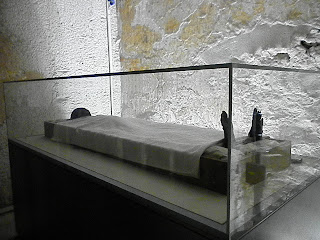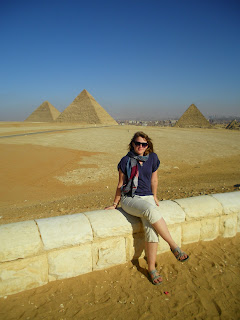So, sorry this is a little late. I
know I said I'd get this out like a week or a week and a half ago or
something. I'm sure you all know how school can get as finals week
approaches. I'm having to find time to go to Bethlehem, write
papers, study for finals, and get packed to go home. It's crazy, but
I'm really enjoying it and these last few weeks have been good ones.
So! After much anticipation, the
Triclinium Meal.
The Triclinium Meal is a Roman style
meal in which the tables are arranged in a “U” shape so that
entertainment can be done in the middle, while people eat, and the
servers can easily bring food via the center. The tables are low to
the ground and, instead of chairs, everyone reclines on pillows. So,
everyone lays down, leaning on their left elbow, leaving your right
hand free to eat. Also, fun fact, if you were really Roman, then you
ate till you were full, forced yourself to throw up under the table,
and continued eating. That's what I call feasting like a boss. So,
during the time of Jesus, this is how people had feasts. Someone
would rent out a building for, say, passover, and eat this way. The
host would sit in the second chair on the right side of the “U”,
with his most beloved guest in front of him, and the host in the
third seat.
This is exactly what we see in the
Bible for the last supper. Jesus “reclined at table, and the
apostles with Him” (Luke 22:14). He was the host. His most
beloved disciple, John, reclined with his head on the chest of Jesus,
and Jesus reclined with His head on the chest of Judas, the guest.
Across the table from them, was Peter, in the last seat, who had
remembered that those who place themselves last are first. He would
have been right in view of Jesus, across the way. Think about the
setting of this here. Just previously to this, while the upper room
was being prepared, Judas agreed to betray Jesus. And here he is, at
dinner, with Jesus' head resting on his chest. He's laying on his
chest as He announces to His disciples that one of them will betray
Him. John, on his chest, leans back and asks who it is (John 13:25).
He tells them that whomever he dips bread with, will be the
betrayer. Then he dips a piece of bread, and gives it to Judas.
Jesus turns to Him and says, “What you are going to do, do quickly”
(John 13:28). I can only imagine what Judas is thinking at this
point and how fast his heart is beating, which Jesus can quite
obviously hear. Judas gets up to leave, which would almost be seen
as rude, and Jesus assures the disciples that it was alright.
Shortly after, Jesus looks across the way to Peter and predicts his
denial. That night, they leave to go back to Bethany, over the Mount
of Olives, it's late at night and on the way he asks them if they can
stop by the garden to pray. This wouldn't have been unusual. It's
something Jesus did with them countless times. And while He's
praying and exhorting the disciples to pray with Him, Judas appears
with the people to arrest Him and Judas kisses Him. Peter then
strikes the servant of the high priest with his sword, and cuts off
his ear. What's interesting about this part, is that, with John
being in the first seat at the dinner, it was his job to protect
Jesus. That first seat is reserved for the favored guest and the
person who is also supposed to protect the host. But John doesn't
strike the man. Peter, so earnest to be favored by Jesus strikes the
man. Also, in Jewish thought, the Messiah was supposed to physically
fight the Romans and restore Israel to its people. I'm sure that
Peter saw the guards coming to take Jesus, and thought that this was
their time to begin the rebellion. Jesus, however, corrects Him,
says His peace, and goes with them. From here on out, one by one,
all the disciples leave Jesus except for John. All the men who said
they would never leave Him, all of His friends, do leave Him. Judas
is then paid his 30 pieces of silver, which you would hope is a lot
of money, but it is the same amount of money to be paid to someone
when one person's ox accidentally gores another person's servant. It
was a small wage to be paid for the death of our Savior. So the
guards first brought him to Caiaphas, the high priest. The trouble
about being the high priest, or any person of position in Jerusalem,
during this time is that you had to appease the Jewish people and
Rome. And Rome's policy, was to keep the people happy. Caiaphas
couldn't condemn Him by law, without the Sanhedrin. But everyone was
gone for passover. So he sent Him to Pilot, when the morning came.
Standing before Pilot, Jesus is almost quiet about His accusations
and does not try to defend Himself. He lets the people do what
they're going to do. Pilot, who was not very loved by his people,
needed to appease them in this crucial moment. If they were going to
crucify Him, they had to do it before sunrise, before shabbat began.
It would have been strange to convict and punish a man within 24
hours, so Pilot asked the people what they wanted. And they wanted
Him dead. So Jesus was beaten within an inch of His life, and, with
open gashes on His back, is forced to carry His cross to His death.
He is nailed on the cross, eye level with His condemners, so that
they may look in His eyes while mocking Him, and His only family
around is His mother and John. He looks at John and says, “This is
your mother”, and looks at His mother and says, “This is your
son”. Replacing to her the son which she is now losing. And as
the passover lamb is being sacrificed in the temple, so our Savior
Jesus is being sacrificed for us. So He died for us, with few friends
around to love Him, all of them having scattered. Some of His
disciples, such as Nicodemus, were probably powerful enough to have
delayed or stopped His death but didn't. I can only imagine what the
disciples felt later on as they recorded the events of His death,
finally having understood why He had to die.
This is the story that the president of
our school told us, while we were laying down and eating, at our own
Triclinium meal. The whole room was dead silent. I've never heard
the story told in such a way. In such a calm and chilling way and
I'll certainly never think of Good Friday the same way again.
Here are a few pictures to give you a general idea of a Triclinium meal. Of course, we have a lot of people, so people were sitting on the inside of the "U", when that isn't technically right.
















